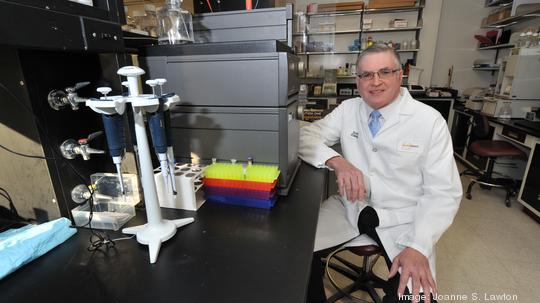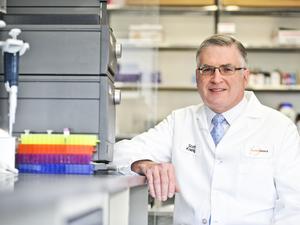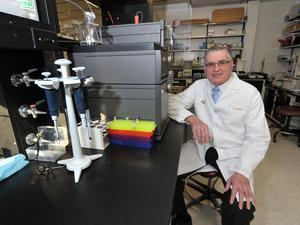
Rockville biotech MacroGenics Inc. will be taking its first product to market.
The company said late Wednesday afternoon the Food and Drug Administration has approved Margenza as a treatment for patients with metastatic HER2-positive breast cancer in combination with chemotherapy. Specifically, those patients would have received at least two previous treatments, with at least one for metastatic disease.
MacroGenics (NASDAQ: MGNX) said it expects the therapeutic to be available in March 2021.
The company’s share price closed nearly flat at $24.72 Wednesday, before its announcement. It shot up more than 17% to $29 per share in after-hours trading.
It’s “an exciting milestone for MacroGenics and, more importantly, it brings a new treatment option to metastatic breast cancer patients. We are grateful for the patients who participated in this study, as well as their families, and everyone who played a role in helping MacroGenics reach this milestone,” Dr. Scott Koenig, its president and CEO, said in a statement. “As we prepare for our first commercial launch and look forward to being able to deliver Margenza to patients, we continue to focus on developing and commercializing innovative antibody-based therapeutics for the treatment of cancer with eight product candidates currently in clinical development.”
The FDA’s decision came two days earlier than expected, and about a year after the company initially submitted its application to the regulatory agency.
The drug’s active ingredient, margetuximab, targets the HER2 gene that can fuel cancer cell growth. MacroGenics, which focuses on antibody-based cancer treatments, is also examining margetuximab in patients with gastric cancer. Margetuximab — for which MacroGenics said it spent more than $77 million on alone in research and development in the past two years — is just one of several drug candidates the company has been testing since its 2000 founding.
In preparing for a potential federal approval, MacroGenics had already inked a five-year deal with Milwaukee life sciences firm Eversana to help it sell the therapy in the U.S. at a greater scale. The local company, which counts 384 full-time employees, mostly in research and development, said it doesn't expect to hire its own internal sales force, opting instead to partner with more third parties to sell and distribute the product in a breast cancer drug market that's estimated to grow by at least $30 billion by 2026.
Given that market size, margetuximab holds tremendous financial promise for MacroGenics, whose revenue up to this point has come mainly from licensing deals. Its revenue totaled $52.2 million for the first three quarters of 2020, up from nearly $39 million for the same period of 2019, according to filings with the Securities and Exchange Commission. The business also suffered a net loss of $127.7 million for the first nine months of this year, slightly wider than the same period last year. MacroGenics closed September with $280.7 million in cash, cash equivalents and marketable securities — after raking in $74 million in net proceeds from selling more than 2.55 million shares of stock.
The company had also, in 2018, signed a licensing deal with Zai Lab Ltd. for that company to further develop and sell the drug in its territories of mainland China, Hong Kong, Macau and Taiwan should it win approval there. If all goes well with that plan and those sales, that deal could yield MacroGenics another $140 million in payments from Zai Lab for hitting certain milestones, not including royalties on the sales themselves.
Margenza is not the region’s first drug to cross the regulatory finish line in 2020 — otherwise a rare feat for biotechs. It follows the FDA’s June approval of Uplizna, Viela Bio Inc.’s treatment for neuromyelitis optica spectrum disorder, a rare and life-threatening autoimmune disease. That, too, was the first for the Gaithersburg company after it spun out of MedImmune in early 2018 and went public in fall 2019. More recently, D.C.’s Vanda Pharmaceuticals Inc. earned a green light from the FDA for Hetlioz, its existing drug for non-24-hour sleep-wake disorder, as a treatment for nighttime sleep disturbances in Smith-Magenis Syndrome.



